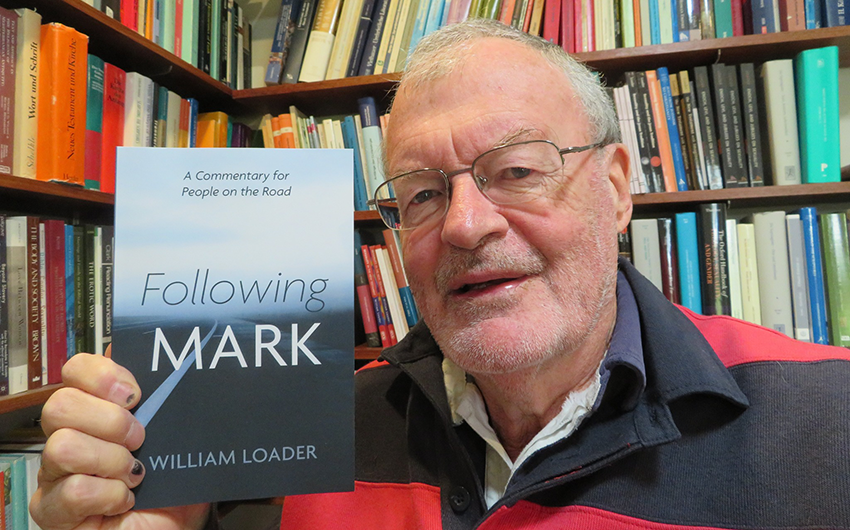In following the Revised Common Lectionary through the year, each year the Gospel reading has a focus, for a large part of the year, on one of the Synoptic Gospels. So this year we have been following stories in Mark’s Gospel (with the obvious exception of the past five weeks, when we took a detour into John 6).
Mark’s Gospel majors on discipleship, on what it means to follow Jesus as a faithful disciple. “Follow me” is an early exhortation of Jesus; to the four fishing disciples (Mark 1:16–20), to Levi the tax collector (2:13–14), to the crowd following him on the road (8:34), and to a rich man (10:17–22). One of my ministry colleagues, Peter Hobson, coined the term “followship” (blending following and discipleship) to characterise this focus.
So it is no surprise to receive a book focussed on Mark’s Gospel, with the clever title Following Mark. The subtitle, A commentary for people on the road, also picks up on the repeated motif of Jesus and the disciples being “on the way” or “on the road” (3:23; 7:31; 8:27; 9:33–34; 10:32, 52; 11:8). The book is written by William Loader, professor emeritus at Murdoch University, Perth, a minister in the Uniting Church in Australia, and an internationally recognised New Testament scholar with extensive publications.
Bill Loader, as I know him, always writes with an open, inviting style that encourages thoughtful engagement with the biblical text. This short book is no exception. The pages brim with lucid explanations, grounded in thorough scholarship; vivid images, designed to bring the story to life; and provocative questions, to deepen the life of discipleship of those who read this book.
There are five main sections to the book, each with a title that encapsulates the key focus of the stories in that part of the Gospel: The Beginning (1:1–4:41), The Expansion (5:1–8:26), The Identity (8:27–10:52), Jesus and the Temple (11:1–13:37), and The End? (14:1–16:8). These are the logical groupings of sections of text which many commentators have recognised.
Within each of those sections, there are four or five subsections in which a translation of the passage is given under the heading Listening to Mark, followed by three to five pages of discussion under the heading Thinking about Mark, and a short conclusion called Reflection, which offers two or three questions designed to stimulate ongoing thinking, or perhaps as the basis for a small group discussion of the relevant section.
Loader’s own translation of Mark that is included is peppered with some wonderful turns of phrase that reflect how Australian ears hear the stories about Jesus. He maintains the Markan use of present in the midst of past tenses, which gives the whole narrative a much less formal style, more in the manner of telling stories while gathered around a campfire, perhaps. John is baptising in the outback instead of the wilderness (1:4, 12); the healed leper, in his rejoicing, “began to blab all about it” (1:45). There is a man with a shrunken hand (3:1, 3), a more prosaic description; “a great crowd” becomes “a great mob” (3:8).
When Jesus encounters some unclean spirits, “he had to tell many of them off” (3:12), while when the disciples encounter Jesus walking on the water, he says “Cheer up. It’s me. Don’t be scared!” (6:50). At one point, people from the synagogue remonstrate with Jairus, saying, “Why keep hassling the teacher?” (5:35). In Gethsemane, Jesus tells the disciples, “I’m terribly sad enough to die” (14:34). All of this adds a fine Aussie touch to the work. (But I did notice that denarii are still denarii.)
For those preaching from the Gospel text each Sunday, there are many comments which will spark further thinking and provide material to enrich their thinking as they develop their sermon. For those reading through Mark’s Gospel in the midst of their already-busy lives, this book provides a concise, handy guide for negotiating the stories it contains.
This book is a fine piece of work which I was invited to recommended, along with others who are teaching New Testament or are engaged in ministry formation processes. Assoc. Prof. Robyn Whitaker, of the University of Divinity, notes that Loader’s “deep knowledge of the text and its historical setting shines through”.
Prof. Paul Foster, of Edinburgh University, says that the book “distills the insights of a seasoned scholar and brilliant communicator into a highly readable format”. Cathie Lambert, formation coordinator in the Uniting Church in Western Australia, comments that “Loader’s clear and accessible explanation of nuances of translation, cultural and geographical contexts, and links to the Hebrew Bible provide the reader with a firm foundation for contemporary interpretation”.
You can order a copy here.
You can view a full list of Bill Loader’s publications at his official website.
Rev. Dr John Squires is the Editor of With Love to the World. This review originally appeared on his blog, An Informed Faith.














